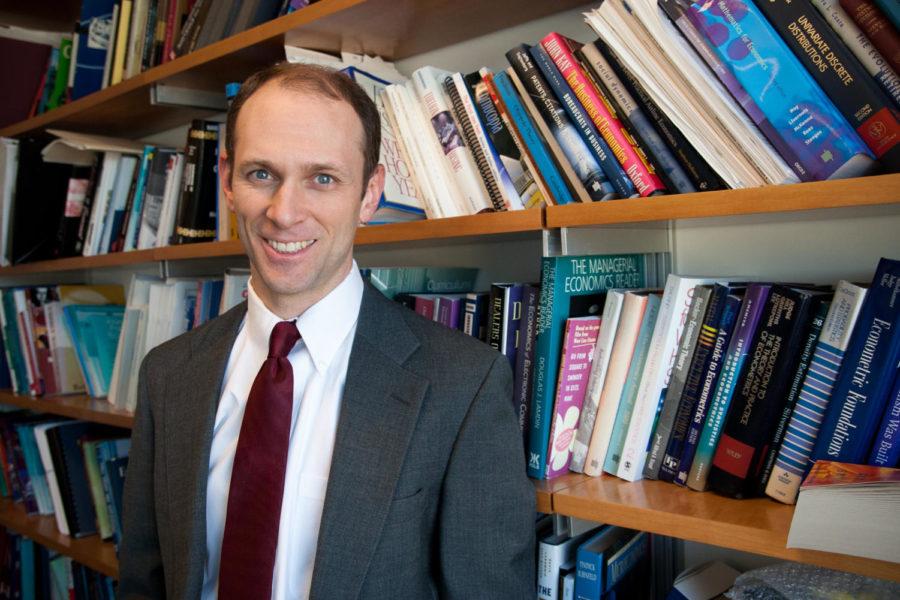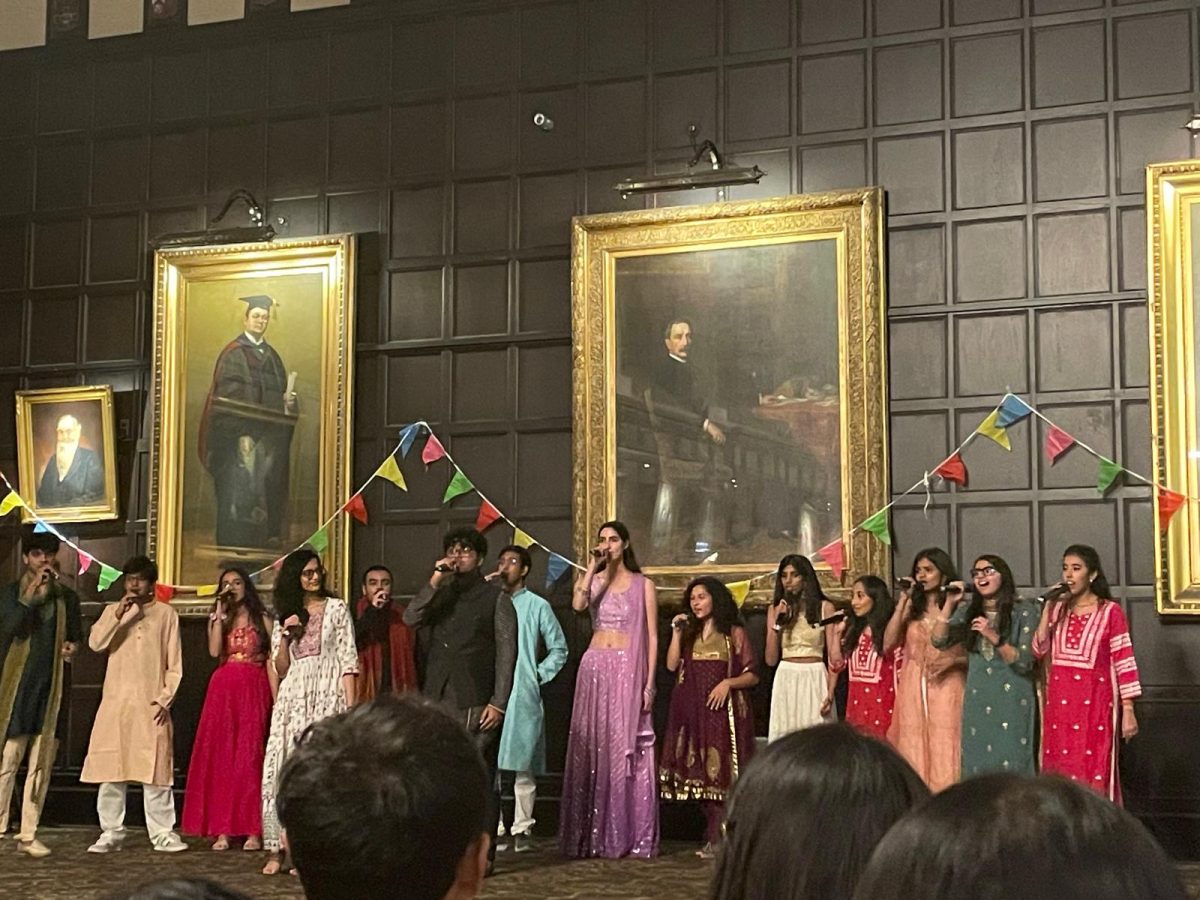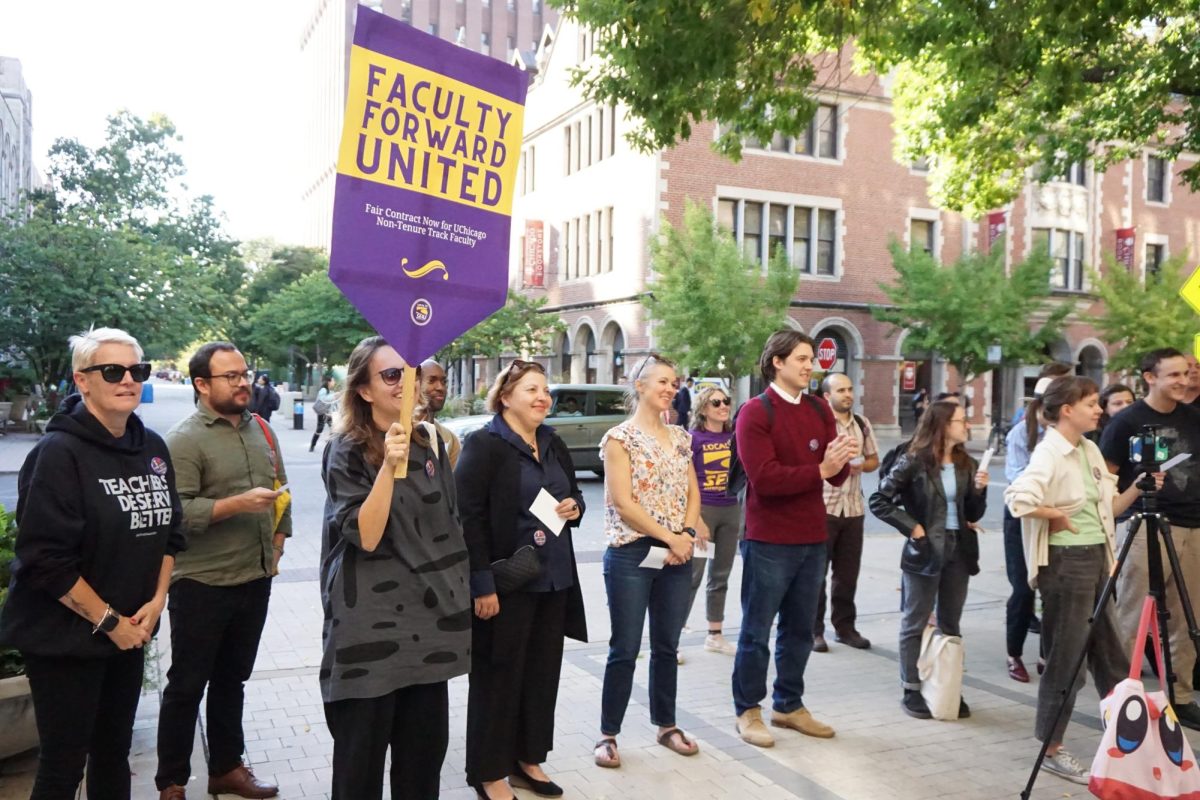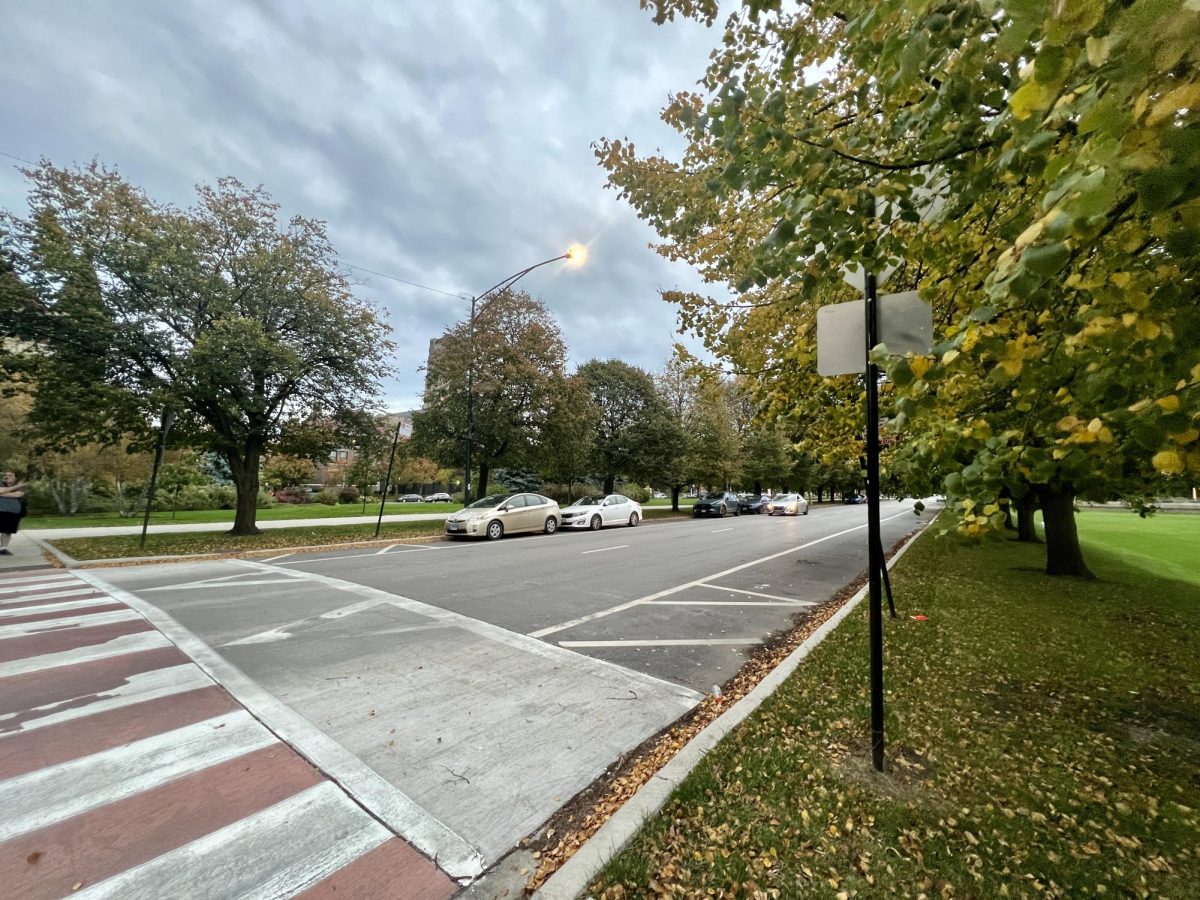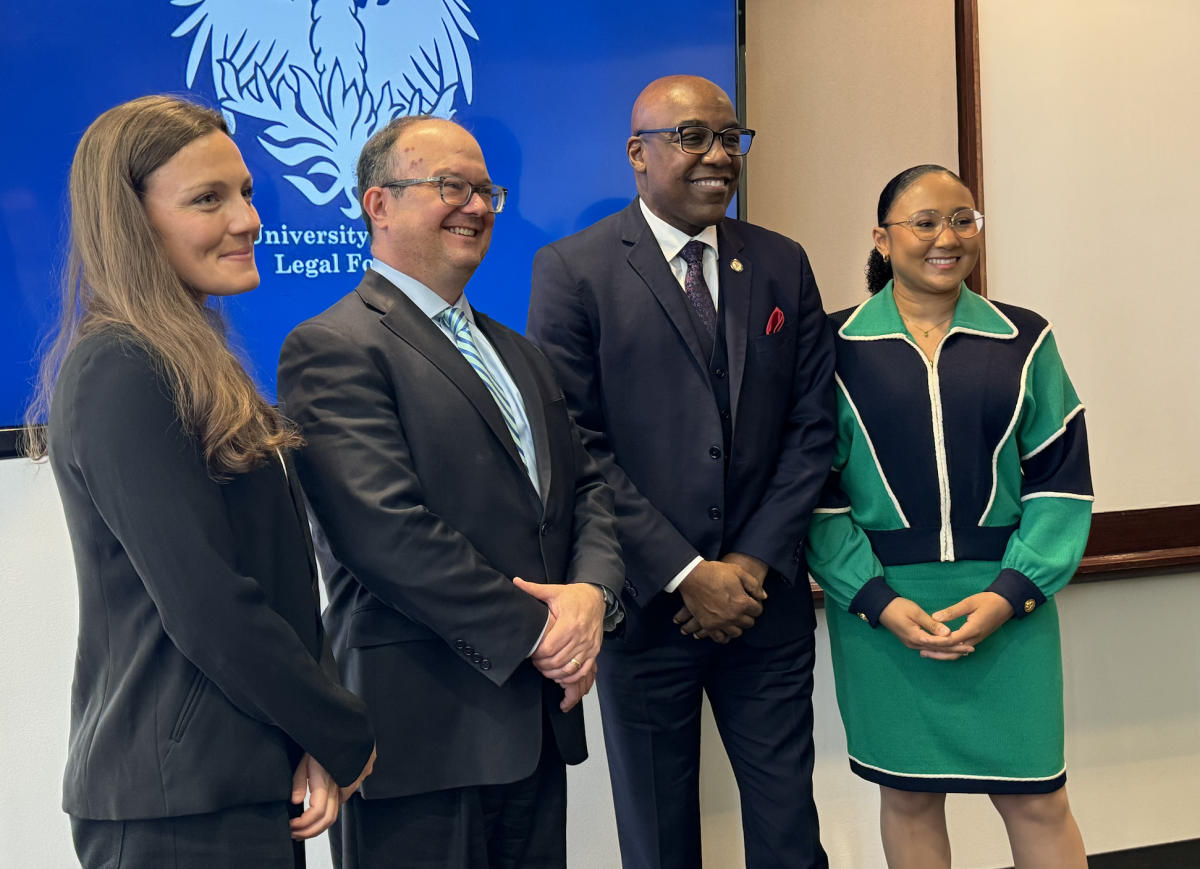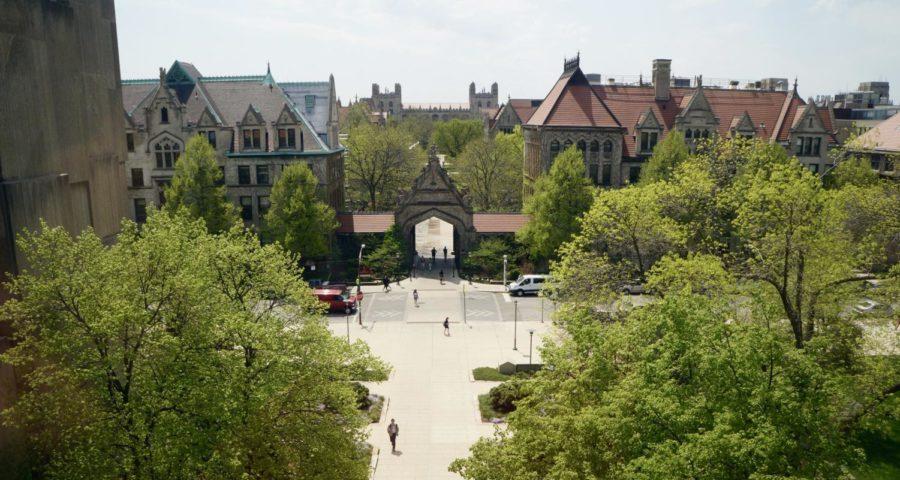Austan Goolsbee returned to his post as the Robert P. Gwinn Professor of Economics at the Booth School of Business over the summer after spending the past two years in Washington, D.C. Prior to his appointment as Chairman of the Council of Economic Advisers (CEA), he served as senior adviser to President Obama’s Council on Jobs and Competitiveness, and a staff economist for the Economic Recovery Advisory Board. Goolsbee, who was the youngest member of Obama’s cabinet, has long been a close aide to the president, previously serving as an economic advisor in Obama’s 2004 Senate campaign and the 2008 presidential election.
The MAROON spoke with Goolsbee about his work in Washington, D.C., President Obama’s decision-making style, and how U of C students are about as stressed as White House staffers.
CHICAGO MAROON: What have you been up to since you returned to the University?
Austan Goolsbee: I haven’t started teaching yet, but I’ve been trying to get back into research. I’ve been working with my colleague Anil Kashyap on this subject of trying to understand why companies appear to be profitable but not investing, not just in the U.S., but really it seems like all over the world.
CM: Do you have any teaching plans?
AG: I’m teaching in the spring, my Telecom and Media class. That should be fun, but it will involve a fair amount of work. A lot has changed since I last taught that class in the world of media and high-tech stuff.
CM: What factors made you decide to come back to UChicago? Why do you value your career here versus working in Washington?
AG: I had never intended to go to Washington forever, and I had been working pretty intensely on the campaign for a couple of years, and then was in D.C. for two-and-a-half years. It’s very unusual for people to leave for too much longer than that…You can go on leave for a couple of years, but most of the people who stay much beyond that never really go back to being academics, they just kind of stay in Washington forever. I definitely did not want to do that. My leave was naturally up. It was the summer. I thought it was the best time to come back.
CM: How do you compare your work in academia to the kind of work you did in Washington?
AG: Pretty different. The sum of the subject matters was the same, as I worked on a lot of tax and public policy regulation kind of stuff; I had worked on studying different industries. So some of the subject matters were similar, but the nature of policy feels totally different than academics. Partly, the standard of evidence is so much higher in academics, and you have the luxury of being able to take time to figure things out. In Washington, you really don’t have that. It has the downside that the basic question of academics, if somebody comes and presents a paper, we’re constantly trying to figure out, well is this really true, or is there some other thing going on?
People tend not to ask that question in D.C. Partly it’s because you don’t have time, you’re scrambling, you have imperfect information, you’re not going to be able to get all the data in time. The second way it felt pretty different is, in academics, the basic unit of activity is an individual paper and one professor. You’re working with one co-author. It’s not really a team sport. Washington is much more like working at a big organization. That’s a weird adjustment for an academic. There’s a lot of bureaucracy, there’s lots of coalition building—a lot of the things that I think characterize working for a big organization—which a university is totally not. The culture is completely different.
CM: What role do you expect to have on the campaign for President Obama next year?
AG: Probably no official role. I’m totally supportive of the President, and I help them with whatever they need, but I probably won’t play as much of a formal role. I talk to David Axelrod a fair amount. He’s a good friend. I’m friends with everybody on the campaign, the policy director, Jim Messina, the head of the campaign, and so I’ll probably help them. Most of the policy doesn’t really get done in the campaign when you’re the incumbent. It makes it pretty different than 2008 when the policy shop was all down here. I signed up for a monthly column with The Wall Street Journal, and I may sign up to be a commentator on TV with economic kind of stuff, so that could be pretty fun.
CM: What issues do you think will dominate the election next year?
AG: Definitely just the state of the economy; within that much of the public attention is about the job market, but I think how the GDP is growing is the more fundamental thing, is what drives the job market. Within how the economy is doing, I think what’s happening in Europe and whether they’re melting down is going to have a big impact. I think what’s happening with whether we’re growing faster or slower than productivity growth, i.e. whether jobs are going to be improving or basically stagnant, is going to be quite important. It feels like these issues of taxes and somewhat the deficit, but it feels like all the Republican candidates so far, while saying they care a lot about the deficit, each one has proposed a tax plan that would increase the deficit at least $3 trillion over 10 years.
CM: Do you think Americans are willing to seriously confront these issues all the way up until the election?
AG: I do, but I think there’s confusion in a lot of different views held even by the same people. You have big majorities say that they agree with Republicans that we need to cut spending, but then you have even bigger majorities say they don’t consider Medicare and Social Security to be spending. In that environment where some of this stuff is technical, but in general people haven’t sat down with the numbers and looked at them, there’s room for a lot of confusion.
CM: What kinds of things were you doing as Chairman of the Council of Economic Advisers on a daily basis?
AG: The CEA is basically an internal think tank run for the president about the economy. It’s not like the Office of Management and Budget (OMB) or the Treasury who have specific…. The OMB must prepare the budget, and that’s kind of their main focus. Treasury is tasked with issuing the U.S. debt, and they have a bunch of line responsibilities. The CEA is more like a think tank. It’s staffed by almost entirely economics PhDs. I did on a daily basis two to three things.
One is [the] CEA is involved in all of the policy processes which usually they’ll meet, the staff will meet, it’ll come up to the deputies, and finally it will get to the principals, where the head of the Treasury, head of the OMB, head of the CEA, head of the NEC, will meet about what we should do. I left just before they were coming out with the jobs plan [President Obama’s American Jobs Act]. In the preparing of the jobs plan would be a perfect example, or preparing the budget, which starts in the fall going into next year. We just have many meetings to work through what policy should be in this, what do we recommend to the president, then we get it up, then we go meet with the president, we present, “Here’s what we all think,” or, “Here’s where there’s a disagreement.” So one is taking part in just the policy process.
Two, the CEA gets all the economic data the day before it comes out, and they prepare for the president the cliff notes version of “Here’s what you need to know about the data: the unemployment rate is going to come out tomorrow, it’s going to go down by four-tenths of a point, here’s why this is happening, this is what you need to know.” So one was data and briefing, one was the forming of policy, the thinking on those issues. Sometimes it would go the other way, and instead of bubbling up from below, the president would say, I want to do this, or I’m considering something, or Senator so-and-so is proposing this, so the CEA would ramp up into that.
And third, I did a lot of talking to the press, talking to business people, business groups, unions, voters, a bunch of things about the economic policy, about the economy, and explaining what we were doing, or how did we see the economy going. Those are probably the three most frequent things. There’s a subset of things, like the CEA puts out the weekly economic briefing, the CEA puts out the economic report of the president once a year. For a month, they’re working on the chapters about the state of the economy. In general, that’s basically what the job is.
CM: What’s the one specific policy that presented the biggest challenge, and were you happy with the way it was handled?
AG: It was such an intense time to be involved in economic policy. When we come in, the month the president takes office is probably about the worst month in the entire 64 years of data that we’ve had on GDP. Certainly that six-month period is the worst. The most difficult things were probably in the spirit of: How do you confront the total free fall of the private sector in the U.S.? How do you avoid us going into a depression, which would be characterized as big economic downtown, big financial crisis, leading to collapse of the financial system, so we go down into an environment that we can’t get out of. The normal self-correcting mechanism doesn’t exist.
I would say there were some fits and starts that were begun under the Bush administration. They did some things well and they did some things that put us in a bad position when we came in. But overall, we didn’t have a depression, and I think history will look back and say that was quite an achievement, because I think it was pretty close. Dealing with the fallout of that financial crisis and rescue, however, it didn’t prevent the worst recession of our lifetimes. We tried in many different ways to reduce the severity of the recession, with some effect, but I think there are many areas where there’s still a long way to go, and we continue to live with the fallout of that.
CM: What policy are you most proud of from your time in Washington?
AG: I don’t know, I didn’t really think about it. I went there, I knew the president, we were friends, he was here at the University, obviously, and I had helped them for many years. So I went there thinking, the country is in a tough spot, you should go to help the country. I wanted to help the president. My attitude had always been a little bit like the guys in a NASCAR pit crew or something. He’s driving the car, my job is to get the tires off and change [them] and help him get gas in the thing and get back out on the road. I wasn’t going there with an agenda of, I want to do A, B, and C, and we did them. I think overall the administration should be most proud of having prevented a second Great Depression. And that was the order of the day, and they had to do it, and they did.
CM: How much do you think the knowledge of economics factors in to policy decisions? Was there a difference between the empirical data and the way you had to advise President Obama? Were there limits to the knowledge of economics?
AG: To have some framework to think about things other than just what the newspaper says, or what’s obvious seems quite important. So thinking through things like, if we put this in or we get rid of it, what do we expect to happen? What would be spillover problems or benefits is basically the economic way of thinking, and that’s quite important. More at the level of economics that’s most useful is more kind of the intermediate micro level rather than PhD thesis-level. To [the] question of, well, how does it apply in the policy making process, it varies a lot depending what the policy is and who you’re dealing with. So if we’re generating new policy or we’re thinking through a budget, there’s a bit of a set piece that we can think about and apply economic logic to.
Frequently there are tons of things coming back at us from Congress, where it’s Senator so-and-so says that the industry in his state is the greatest, and they want to pass something banning all other industry. That’s where being able to just apply Chicago Price Theory, as we would think of it, on a rapid basis, is pretty useful. Just to say like “whoa, whoa, whoa, wait a minute, this is a terrible idea.”
When I was an undergraduate [at Yale], I took the last class that the old guy Jim Tobin, who was a Nobel laureate, had ever taught. And I became his research assistant, and he had been on the CEA under Kennedy. He would always tell us all these stories about when he was in the government, both that it was the highest honor, that the whole point of economics is to be able to deal with crises, that it’s not just a game, that it’s really important. But also, insane stories of things that people proposed that the CEA would fight against. So when I went there I called Bill Nordhaus who was another one of my teachers as an undergrad, and he had been on the CEA, and he said, “The job of the CEA, like that of a good gardener, is 90 percent pulling weeds, and 10 percent planting seeds.” And I certainly found that to be true.
CM: Why do you think academics are often called to this position rather than people from the private sector?
AG: It’s not really an answer to say it’s always been that way, but it has always been that way. There are sometimes private sector economists who go on the CEA. There is a chair and two members, and then there are about eight to 10 senior economists. There’s usually one person delegated from the Fed. They’re in similar parts of their careers—sort of mid-career professionals, high-level tenured professors, or high-level economists from government. Sometimes one of the members…there will be the chair and then a macro person and a micro person. Usually Wall Street or private sector economists are exclusively macro, and usually they’re about forecasting. That tends to be one part of the CEA’s job, that it oversees the forecasting of the U.S. government. But there is a professional forecaster on the CEA staff already. One reason the private sector guys are not [there] as much, is that that embodies only one small aspect of what the CEA does. I think that’s the main reason.
CM: Do you think people from Wall Street offer different policy decisions, and how do you think that plays differently compared to the thinking of academics?
AG: The kind of types that I would know on the economic side, the chief economist at Federal Express, is just as good, it felt like to me, as the guy from Wall Street, because they’re observing a whole bunch of data that the Wall Street guys didn’t have. In general, I do think people from the private sector come with a different perspective, on average, than the academics. And those two are different than people who predominantly had been in the Washington policy community all along. I don’t really know the answer, more than that. I do think they have slightly different perspectives, but they also often have different jobs…. They had a number of private sector people who gave up their jobs and went to work at the Treasury. But there, they’re trying to do things like, you know, design the rescue plan…monitoring AIG…or modify the TARP [the Troubled Asset Relief Program]. Stuff like that, you kind of need people who are from that industry in order to do it.
CM: Ron Suskind’s book called Confidence Men came out this year, and it seemed to present the administration in a sort of dysfunctional light. Did you sense any discord between personalities or working styles?
AG: I mean politics, it turns out, is political. I don’t think it’s a big surprise. Ron Suskind’s M.O. is to try to find what was every argument and write about that. I read, I flipped through and read much of the book. I thought the two things that were way off base in my experience were on the specific charge of: Did the President order Citibank to be dissolved and did Tim Geithner [Secretary of the Treasury] ignore him? That was just factually not correct, that isn’t what happened. The question was always: What’s going to happen once the stress test is over? That fed into some broader narrative, thematic narrative that Suskind wanted to write about even before he talked to anybody, that is that in some sense the President wasn’t in charge and wasn’t decisive, and…that did not comport at all with my experience. The President has no problems making decisions, was in charge, and the examples that Suskind does find of people…complaining about the President or complaining about the process were usually when the President had overruled them and said ‘do what I say’ and they were sort of grumbling about that.
To me it felt like Suskind missed the basic, on his basic theme he was fundamentally wrong. But you know he talked to some people and he’s identified different bickering over this and that and people writing memos that they don’t like each other. Yeah, stuff like that happens all the time in organizations. That’s no different in any White House. I thought his basic theme didn’t feel true to me.
CM: You’ve worked with President Obama for quite some time now. How do you view his leadership style and his decision making style?
AG: It probably depends a little bit on what the thing is and it definitely has evolved over time. Something about being the guy to order the guy to order Osama Bin Laden killed and stuff like that has made, I means he’s, he definitely grew in stature and if you met him now it’s not like the old days where everyone was friends and called him by his first name and this kind of thing. I mean now he’s definitely the President. I would say his style, he’s always been personally, it strikes me, he has a personal desire to be more of an older Washington-style [president], of here are the things you have, here are the things I have, let’s make an agreement and let’s do something and then let’s get on with it. That’s been a hard style to apply to the Washington of right now because you’ve got a, you’ve got kind of a hardened group of opposition who if the President’s for it they hate it.
What I used to call it, it’s like they’ve got the East German judges at the Olympics thing going where if the President hits a triple flip, it doesn’t matter, they’ve already got the ballot filled out and they’re giving him a two. And we saw in the debt ceiling negotiations that there’s a hard core group of opponents of the President who absolutely do not want to make a deal even if the deal would make the economy better, even if the President offered them bigger spending cuts than have ever been contemplated…It’s just a fight to the death. They know perfectly well it’s not going to work. In some sense that’s the intention. But I would say number one, the President’s frequently oriented around, “Let’s get to some agreement, let’s make some progress, too,” and it makes the following trait, it makes the kind of lifetime Washington people uncomfortable.
He’s frequently wanting to get out of just the normal information channel. He doesn’t want to just have one person summarize, ‘Well here’s what the people who don’t agree with what I’m about to tell you say…blah, blah, blah.’ His first reaction to that is: ‘Well where are those people? I’d like to hear from them! I don’t want to just hear from your characterization of what they say.’ I always thought he got this feature from being at [The University of Chicago ] Law School or maybe it’s like his legal thing. He likes nothing better than having just a room full of three or five smart people and their different views and they’re going to argue and he’s going to Socratically quiz them—‘well what about this, what about that?’ And from that he’s really good at kind of honing in on some of the core issues. I’d say those two things characterized his style.
CM: Considering his style and temperament, what is it like working with him?
AG: The public characterization that he doesn’t have big highs and lows, that he’s not super emotional, that’s fairly accurate at moments like the depth of the economic crisis. That felt great because everyone has opinions but ultimately most of the policy people were pretty nervous, of like ‘woah, wow, what are we going to do?’ And the President is always the guy, in my experience, was always the guy saying: ‘Look, settle down, don’t everybody get all worked up, we’re going to sort it out, we’re going to methodically work through one, two, three, four.’ So working with him, if you’re looking for someone who’s cool and collected, is great. That’s his kind of thing.
Going from the campaign to actually being in the government feels like a dial up of a level of scrutiny and intensity, and I guess the way I’d say it, where here (UChicago) people can have a bunch of theories, say the housing market, ‘oh they should do A, B, C, oh the banks they should do this thing that thing.’ When you’re actually sitting there and what’s decided at this meeting in the Oval Office is going to determine what’s done, there’s a level of stress there that’s not that comfortable.
CM: You were named the funniest man in Washington at one point. Can you tell us your favorite funny story from your time there?
AG: That was a contest that I won. But my favorite funny story—Washington D.C. has very little sense of humor about themselves at all. I would constantly try to at least provide some relief or lighten it up. My own emotional, my only way of dealing with [the] stress of [a] negative environment is to try to make fun of it, so that was my M.O., and that’s not always very well received at this kind of thing. I would go to these big international meetings, at one point Larry Summers said, ‘You were at the OECD,’ and he was like, ‘Well I guess these analogies aren’t on the S.A.T. anymore but they used to be, he was like ‘Austan Goolsbee is to the OECD as George Marshall is to Stephen Colbert.’
But the funniest story from when I was in Washington is probably, well I can’t tell if it’s the funniest or if it was the most enjoyable to me—the day Rahm left to come run for mayor. Rahm [the former Chief of Staff to President Obama] was very ‘pound his fist.’ Every morning we’d have a meeting in the Roosevelt Room [of the White House] of all the heads of all the, the senior staff meeting, like the heads of all the agencies and departments, and Rahm. Rahm would pound his foot and would be like ‘today we march!’
So the final day, one thing he was obsessed with as a congressman and as the Chief of Staff was with Asian Carp, you know, the fish. So I called all around and I got a seafood distributor to get a carp, a dead one, and send it to me. It was a nasty-looking fish and it was too big to fit in our freezer so I had to put it on our porch and it was totally stinking. So I wrapped, now he gave a dead fish to a pollster one time that he was mad at. So I wrap the fish in a box like it was a present and I brought it to the senior staff meeting.
Now when you park at the White House, there’s all these barricades you have to stop at, you have to turn off your car, the Secret Service comes out with a dog to sniff. I turn off the car and the bomb sniffing dog goes through and you’ve got to…open the trunk. The culture of the thing is that it’s all very serious. You don’t say, ‘Hey Joe, how you been?’ You just sit quietly and the dog goes around. And they open the back of my car and the dog starts going like [dog sound] and the guy says, ‘What’s in this box?’ and I say, ‘Well, it’s a dead fish for Rahm’s going away present,’ and the guy says, ‘Let him through!’ and they put down the barricades.
So I go in, we meet at the senior staff meeting, and Rahm says ‘CEA, what do you have to say?’ And I say, ‘Well, the producer price index rose 2 percent, but all the policy people got together and we wanted to get you a gift because we wanted you to know how we felt about you and we wanted you to know we’re thinking of what’s in your future. So we got you this present.’ And he’s like ‘really? This is a fucking dead fish!’ and I said, ‘No Rahm, that’s not just any dead fish, that’s a dead carp, and the good news for you is it wasn’t easy to find this thing.’ And he gives me the finger, you know how his finger is kind of cut off, so he goes off. So his chief of staff, the Chief of Staff has a chief of staff, that guy says, ‘Rahm was deeply touched by that present, says that was the most thoughtful gift he’s ever gotten, like it brought a tear to his eye.’ And that is what’s wrong with Washington. You give a guy a dead fish and he was like ‘that means a lot to me.’
So that was really funny. That was the kind of thing I do. It wasn’t as many jokes and stuff, it was more like just lighter moments. I wasn’t averse to using something funny to make a point either. At one point in the middle of the financial crisis we rescued the banks, and because the government guaranteed their liabilities and they can lend it here and they can borrow at zero because the government has guaranteed them they’re making more money than ever before, and then they start paying themselves bonuses based on how profitable they are, but they’re only profitable because the government guaranteed their liabilities.
So they were going in and having a big discussion about the bonuses and the President was kind of annoyed. He doesn’t get angry more than once a year. He’s like ‘let me get this straight, they’re going to be paid based on being profitable and they’re profitable because we made them profitable?’ And I said, ‘Yes, they want to be paid like rock stars and they’re just lip synching the music that the government gave them.’ And I said, ‘That doesn’t make them Mick Jagger, that makes them Milli Vanilli, and even Milli Vanilli had to give back the Grammy! I mean what is this?’ The President and Robert Gibbs and all of them start cracking up. Most of the members of the economic team have no idea. They don’t know who Milli Vanilli is.
CM: Who’s more stressed and depressed, White House staffers or UChicago students?
AG: That is a very interesting comparison. I would say the one major difference is the UChicago students are being crushed under the thumb of their professors, but they’re kind of dutifully going ‘we will march on, we must deal with this.’ It’s very personal. [Their] stress level is administered by the professors. The stress of the White House staff is often times coming from amorphous events out in the world, like how is the economy doing or you know, there’s a revolution…and now the price of gas is going up and so there’s way more scrambling done…I mean it’s quiet desperation and drudgery, you know the stress level…in the White House it’s more like yelling, calling ‘get over here right now, what’re we going to do?’ I mean everyone’s running around scrambling like crazy people. That’s a stressful day in the White House, which feels kind of different. But just walking around with an unbearable weight on your shoulders, that part feels kind of the same.
CM: What did you miss most about Chicago, and what do you see yourself doing these next few years here?
AG: The thing about Chicago (UChicago) and maybe other academic institutions, but Chicago’s the most extreme version, that makes it totally the opposite of Washington, [is] when we go to a seminar, like Wednesdays [in] our seminars, someone comes in and gives a paper, we are in an environment in which in that room you’ll have some libertarians, you’ll have Steve Levitt or some behavioral economists and it’s a wide collection of people who are all in the same room kind of arguing with each other at a really high intellectual level where we’re fundamentally just trying to understand what’s happening in the world.
Washington D.C. is nothing like that. It’s all about preparing for battle and everybody you tend to talk to are the people who agree with you, and you’re prepping to go to battle with the people who disagree with you and there’s no, there’s little intellectual curiosity it felt like, and I missed that a ton. I also just, the University is an amazingly nurturing place for ideas…I just kind of missed being at the University and I missed the city too.
Washington’s a completely one company town it feels like, and it has got its own bubble in a way that Chicago is really nothing like that. If you go to dinner at somebody’s house you’re going to meet a bunch of people who are not related to the University or they’re in a lot of different lines of work, probably never heard of what you’re doing. In Washington I’d do these white boards. They had these White House White Boards. Part of the time while I was there I was taking the subway to work and then the second half I got a parking spot so I started driving. Unlike taking the subway here, people are coming up saying ‘I disagree with whatever.’ There’s…a crazy goldfish bowl intensity, which is just not normal. So I missed being able to kind of having independent sources of information about the economy, opinions of what’s going on that didn’t come through some filter.
In Washington everything’s filtered. Either you’re just getting it from the media or some public information source or if people are coming to talk to you you’re always having to think ‘well wait a minute, what’s in this for them and why are they coming to talk to us, what are they pushing?’ When you’re an academic it’s not really like that. I mean I can go down to Target and just see for myself what people are doing. If I’m talking to somebody, they don’t know who I am. They have no reason to tell me what to do. Nobody’s a lobbyist. The thing in Washington is that tons of people’s friends are lobbyists. Who’s even met, outside of Washington, who has even met a lobbyist?
CM: So what do you see yourself doing in the next few years?
AG: You know, thinking about the economy, explaining stuff, doing something above the median of having a public role in explaining the economy before the government. I’d probably still do that now. I kind of think the world has been good to the economics profession. So we kind of owe it to society to explain ‘why is this useful, what does it help?’ So I’ll probably do some of that and just keep doing research.
CM: So did we do better than Sean Hannity?
AG: I found with most of the Fox guys, they want to attack you, but they’re also just happy you’re coming on, because nobody will ever come on.


